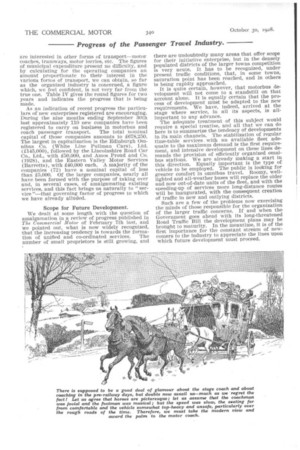THE COMMERCIAL MOTOR 340
Page 20

If you've noticed an error in this article please click here to report it so we can fix it.
Progress of the Passenger Travel Industry.
are interested in other forms of transport—motor coaches, tramways, motor lorries, etc. The figures of municipal expenditure present no difficulty, and by calculating for the operating companies an amount proportionate to their interest in the various forms of transport, we can obtain, so far as the organized industry is concerned, a figure which, we feel confident, is not very far from the true one. Table IV gives the round figures for two years and indicates the progress that is being made.
As an indication of recent progress the particulars of new enterprises registered are encouraging. During the nine months ending September 30th last approximately 110 new companies have been registered to carry on business in motorbus and coach passenger transport. The total nominal capital of those companies amounts to £678,250. The largest In capitalization is the Edinburgh Omnibus Co. (White Line Pullman Cars), Ltd. (£145,000), followed by the Lincolnshire Road Car Co., Ltd., with £50,000, and Amos Proud and Co. (1928), and the Eastern Valley Motor Services (Barretts), with £40,000 each. A majority of the companies (72) have a nominal capital of less than £5,000. Of the larger companies, nearly all have been formed with the purpose of taking over and, in several cases, of amalgamating existing services, and this fact brings us naturally to " service "—that governing factor of progress to which we have already alluded.
Scope for Future Development.
We dealt at some length with the question of amalgamation in a review of progress published in The Commercial Motor of February 7th last, and we pointed out, what is now widely recognized, -that the increasing tendency is towards the forma tion of unified and co-ordinated services. The number of small proprietors Is still growing, and there are undoubtedly many areas that offer scope for their initiative enterprise, but in the densely populated districts of the larger towns competition is very acute. It has to be recognized, under present traffic conditions, that, in some towns, saturation point has been reached, and in others is being rapidly approached. It is quite certain, however, that motorbus development will not come to a standstill on that account alone. It is equally certain that the process of development must be adapted to the new requirements. We have, indeed, arrived at the stage where service, in all its aspects, is allimportant to any advance. The adequate treatment of this subject would require a special treatise, and all that we can do here is to summarize the tendency of developments in its main channels. The stabilization of regular time-table services, with an available fleet adequate to the maximum demand is the first requirement, and intensive development on these lines demands the provision of efficiently organized omnibus stations. We are already making a start in this direction. Equally important is the type of vehicle to be employed. The public is looking for greater comfort in omnibus travel. Roomy, welllighted and all-weather buses will replace the older and now out-of-date units of the fleet, and with the speeding-up of services more long-distance routes will be inaugurated, with the consequent creation of traffic in new and outlying districts.
Such are a few of the problems now exercising the minds of those responsible for the organization of the larger traffic concerns. If and when the Government goes ahead with its long-threatened Road Traffic Bill the development plans may be brought to maturity. In the meantime, it is of the first importance for the constant stream of newcomers to the industry to appreciate the lines upon which future development must proceed.


















































